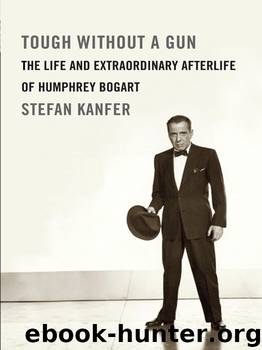Tough Without a Gun by Stefan Kanfer

Author:Stefan Kanfer [Kanfer, Stefan]
Language: eng
Format: epub, mobi
ISBN: 978-0-307-59531-7
Publisher: Knopf Doubleday Publishing Group
Published: 2011-01-31T16:00:00+00:00
iii
Writer and, later, director Richard Brooks maintained that Humphrey’s renunciation of the First Amendment committee signaled an end “to the illusions of life, that everything is going to be fine, that there’s going to be a happy ending. Bogie was never the same again.” This smacks of the kind of romantic wish-dream that stayed with the Old Left for decades, crystallized in a film called The Front. Woody Allen, an apolitical schlemiel who lets blacklisted writers put his name on their scripts, is hauled before HUAC. Defiantly, he responds: “Fellas, I don’t recognize the right of this committee to ask me these kinds of questions. And furthermore, you can go fuck yourselves.” The frame freezes as the voice of Frank Sinatra is heard singing, “Fairy tales can come true …”
For two divergent groups of filmmakers, the period of the blacklist would redefine the notion of masculinity. Opponents of the new studio policy considered themselves loners standing against the violators of civil liberty (i.e., HUAC). Those who furnished the committee with names portrayed themselves as guardians of freedom, fighting thugs (i.e., Communists) who sought the violent overthrow of the U.S. government.
In his drama The Crucible, Arthur Miller would view the superstitious witch hunts of seventeenth-century Salem, Massachusetts, as a metaphor for the anti-Communist hysteria sweeping America in his own time. The playwright’s spokesman, upright farmer John Proctor, is willing to recite his own sins, but “I cannot judge another. I have no tongue for it.” He is hanged for his principled silence.
Screenwriter Budd Schulberg and director Elia Kazan gave names to HUAC. In On the Waterfront they would make their hero, Terry Malloy, a failed boxer turned hired goon for a corrupt union chief. An investigating body is met with a code of silence. Only when Terry’s brother is annihilated by racketeers does the thug spill what he knows to the investigators, and is nearly beaten to death for his action. Given the right occasion, the audience is meant to conclude, informing may be the only way to strike back at criminals.
Which was the true male, then? Was it the rigid Proctor, as originally played by Arthur Kennedy on Broadway? Or the informer Terry Malloy, as portrayed by Marlon Brando? It was a matter of great importance to those affected, but it was not the only way to take the measure of a man, and many refused to be defined in such narrow terms. Humphrey Bogart was one of them. As the decade wound down, he continued to present his own brand of masculinity, which had nothing to do with polemics.
For despite the dire pronouncements about the Bogart soul, Humphrey was not ruined personally or professionally by his choices. Though he remained a liberal in private life, he felt a justifiable anger about the way his name and reputation had been used. To be sure, if Humphrey and the other First Amendment committee members, and the studio heads, and the principal Wall Street investors in those studios had stood together in
Download
This site does not store any files on its server. We only index and link to content provided by other sites. Please contact the content providers to delete copyright contents if any and email us, we'll remove relevant links or contents immediately.
| Military | Political |
| Presidents & Heads of State | Religious |
| Rich & Famous | Royalty |
| Social Activists |
Waking Up in Heaven: A True Story of Brokenness, Heaven, and Life Again by McVea Crystal & Tresniowski Alex(37783)
Empire of the Sikhs by Patwant Singh(23070)
We're Going to Need More Wine by Gabrielle Union(19033)
Hans Sturm: A Soldier's Odyssey on the Eastern Front by Gordon Williamson(18569)
Leonardo da Vinci by Walter Isaacson(13315)
The Radium Girls by Kate Moore(12014)
Tools of Titans by Timothy Ferriss(8363)
Educated by Tara Westover(8045)
How to Be a Bawse: A Guide to Conquering Life by Lilly Singh(7467)
Permanent Record by Edward Snowden(5836)
The Last Black Unicorn by Tiffany Haddish(5629)
The Rise and Fall of Senator Joe McCarthy by James Cross Giblin(5269)
Promise Me, Dad by Joe Biden(5141)
The Wind in My Hair by Masih Alinejad(5086)
A Higher Loyalty: Truth, Lies, and Leadership by James Comey(4948)
The Crown by Robert Lacey(4805)
The Iron Duke by The Iron Duke(4349)
Joan of Arc by Mary Gordon(4099)
Stalin by Stephen Kotkin(3956)
